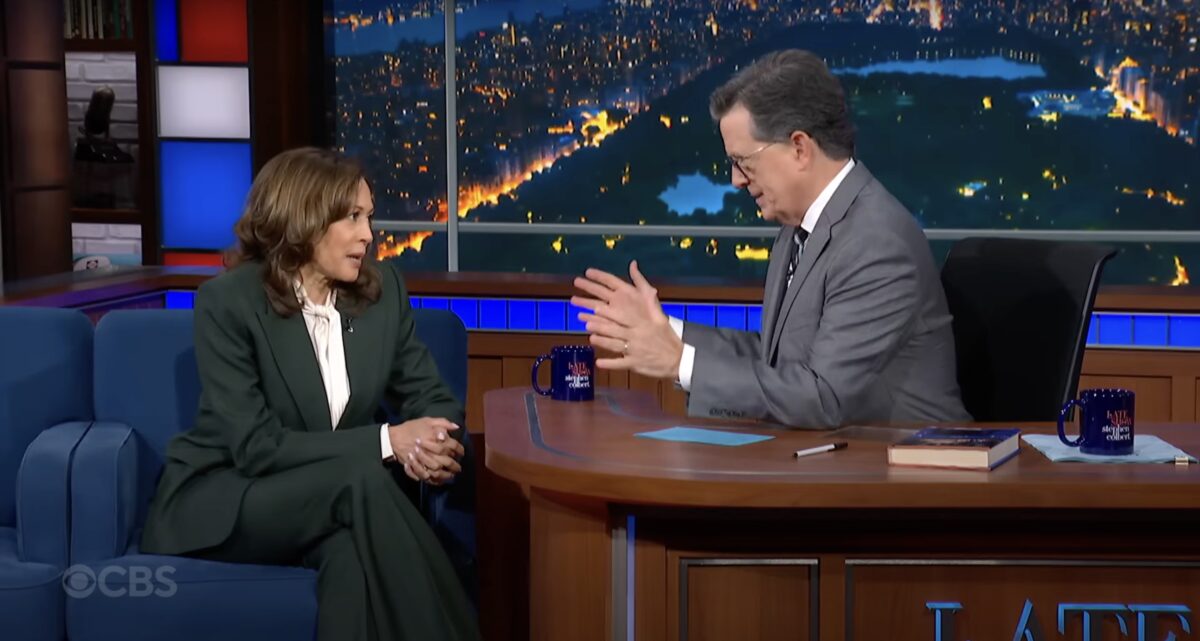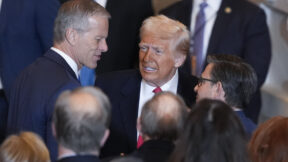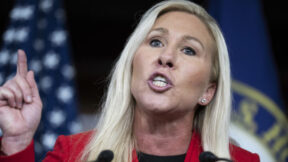Kamala Harris Went on Colbert — and Showcased the Democrats’ Identity Crisis

(CBS screenshot)
Former Vice President Kamala Harris stepped back into the national spotlight Thursday night by sitting down with Stephen Colbert, a famously sympathetic interviewer and longtime fan. It marked the unofficial kickoff of her promotional tour for her forthcoming book, 107 Days, a personal account of her brief presidential campaign following President Joe Biden’s withdrawal from the race.
But while her appearance checked the boxes of charm, relatability, and therapeutic healing, it also underscored the deeper problem currently plaguing the Democratic Party: a leadership vacuum and a disorienting lack of direction.
It’s hard to overstate how friendly the Colbert setting was. The host seemed not just pleased to have her back, but personally invested in her rehabilitation—smiling warmly, making space, and teeing up questions with the urgency of a political hype man rather than a late-night satirist. And yet, what Harris didn’t say spoke louder than any moment of mutual admiration.
She refused to say anything critical about her former political partner, President Biden—even as it remains the defining moment of her presidential run. Biden’s disastrous debate performance and the pressure-cooker of Democratic panic that followed effectively forced him out of the race. It was a pivotal episode in American political history, and one that directly shaped Harris’s path.
Yet, when invited to reflect on that episode, she offered little more than a perfunctory “Buy the book.” That might work for a celebrity memoir. It’s less satisfying when the stakes are the future of the country.
Even more telling was her non-answer when Colbert asked who is currently leading the Democratic Party. She could have seized the moment to assert herself—or name a rising star. Instead, she offered a vague “There are many leaders,” which is the political equivalent of shrugging. In a moment that demanded clarity and vision, Harris opted for platitudes. It felt like waving a white flag in the face of the Trump-driven GOP, which—like it or not—is executing a very real, very detailed plan for power.
The Democratic Party, meanwhile, is still fumbling for the remote.
This contrast couldn’t be clearer when viewed through the lens of Project 2025, the ultra-conservative roadmap backed by many in Trumpworld that outlines how a second Trump administration would dismantle and reconstitute the federal government. Then-candidate Donald Trump tried desperately to distance himself from the document publicly, but eight months after denying any knowledge of it, it’s plain to see that the plan has been embraced and implemented in spirit—if not officially.
That’s the GOP’s advantage: it has a plan. A controversial, potentially authoritarian plan—but a plan nonetheless. What do Democrats have? “Not Trump” has become the guiding principle, but as 2024 showed, that is not a compelling enough message to win.
Consider this: Harris won more votes—75 million—than anyone in U.S. history besides Biden and Trump. That’s more than Barack Obama in 2008. And yet, in the aftermath of her loss, there’s been no loud call to “respect Kamala voters.” No breathless op-eds, no viral hashtags. In 2020, when Trump lost with 70 million votes, conservative media and MAGA loyalists spent months insisting those voters be heard, validated, and even catered to. But after 2024? Crickets.
Why? Partly because it’s unclear how many of Harris’s votes were truly for her—and how many were simply against Trump.
That ambiguity haunts the Democratic brand. Without a clear identity, an inspiring message, or a shared vision, the party is increasingly defined by who it opposes, not what it stands for. That might work in cycles when the opposition is truly radioactive. But it doesn’t build power. It doesn’t build loyalty. And it certainly doesn’t build enthusiasm.
Oddly, Harris seemed more comfortable than ever Thursday night. She spoke plainly. She connected. She felt like a person, not a politician afraid to step on a landmine. And in a vacuum, that’s progress. But viewed in the larger context of the party’s current inertia, it felt less like a reset and more like group therapy. A moment of catharsis for the base, sure. But not a blueprint for what’s next.
If the Democrats want to regain momentum, they can’t keep avoiding the hard conversations. Kamala Harris is still a compelling figure. But until someone in the party steps up with more than vibes and memories, the future remains frighteningly undefined—and increasingly shaped by the other side.
This is an opinion piece. The views expressed in this article are those of just the author.




